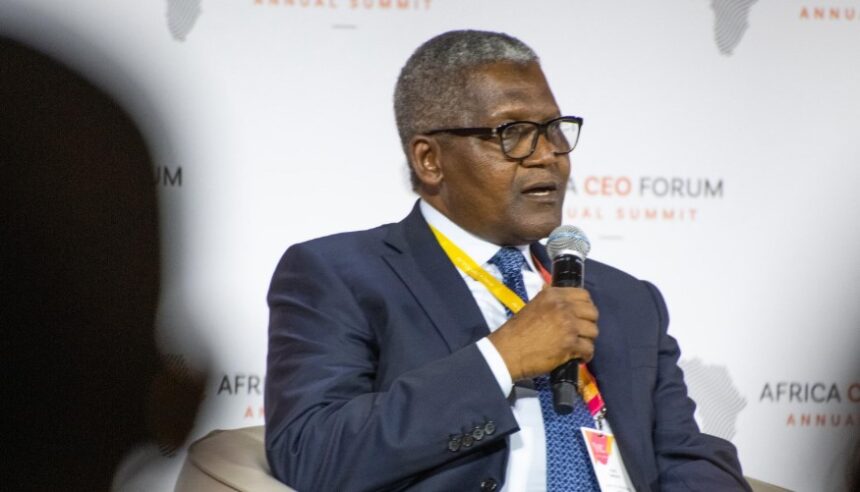In a significant legal dispute, three oil marketers—AYM Shafa Limited, A. A. Rano Limited, and Matrix Petroleum Services Limited—have petitioned the Federal High Court in Abuja to dismiss a lawsuit filed by Dangote Petroleum Refinery and Petrochemicals. The lawsuit, which originated from a summons dated September 6, 2024, includes the Nigeria Midstream and Downstream Petroleum Regulatory Authority (NMDPRA) and the Nigeria National Petroleum Corporation Limited as the primary defendants. The marketers presented their counter affidavit, identified as FHC/ABJ/CS/1324/2024, on November 5, 2024, claiming that granting Dangote’s requests would undermine the integrity of the nation’s oil sector. They argue that a potential monopoly over the oil sector would create disastrous consequences for Nigeria’s economy and energy market.
Dangote’s originating summon asserts that NMDPRA has violated the Petroleum Industry Act (PIA) by permitting the importation of petroleum products when such imports should only occur under product shortfall conditions. The refinery contends that this action hampers local refineries’ development, notably its own. In response, the marketers countered that the Dangote refinery has not proven its capacity to meet the domestic demand for petroleum products. They stress their qualifications for receiving import licenses from NMDPRA and assert that these licenses were legally obtained under the provisions of relevant laws, suggesting that these licenses do not threaten Dangote’s operations or market position.
The marketers argue that granting Dangote exclusive rights would lead to a lack of competition in pricing, potentially driving petroleum costs upwards and creating economic distress for the average Nigerian consumer. They caution that concentrating all oil production in one entity poses a high risk to energy security; any temporary disruption at the refining plant could plunge the nation into a crisis due to insufficient reserves and the time required to import alternative products. Without adequate local production assurance, they claim that the reliance on Dangote could lead to dire socio-economic implications if the refinery were to fail in meeting the country’s energy needs.
Moreover, the marketers’ arguments highlight the absence of tangible evidence supporting the claim that Dangote refinery can supply sufficient petroleum for the daily needs of Nigerians. They emphasize that if the government were to favor Dangote’s interests at the expense of other operators, it would not only endanger Nigeria’s energy independence but also subjugate its consumers to monopolistic pressures regarding pricing and availability of fuel. The marketers urge that the court’s decision should take into account the potential for decreased competitiveness in the oil sector, which could ultimately damages the broader economic framework of the nation.
In the background of this legal feud, Dangote’s operations are already reshaping the petroleum landscape in Africa and Europe. Recent reports indicate that three foreign firms—Vitol Group, Trafigura Group, and BP Plc—garner about 75% of the crude oil processed by the Dangote refinery, which has the potential to produce 650,000 barrels of crude oil per day. This figure substantially surpasses the output capacity of any existing facilities in Europe or Africa, raising concerns about the implications for local markets and pricing dynamics. Since commencing operations earlier in 2024, Dangote has begun producing various petroleum products, including diesel and aviation fuel, and has progressed to manufacturing gasoline as well.
With almost 6 million tons of fuel already loaded since their startup, and the refinery reaching processing rates of approximately 420,000 barrels a day, the Dangote facility significantly affects crude oil availability in Nigeria. The patterns of product loading show a substantial distribution of diesel, fuel oil, gasoline, and jet fuel, indicating a diversifying operational capability. While the refinery’s output is starting to ease the glut faced by Nigerian crude, there remains an evident need for careful regulation and the maintenance of competitive dynamics within the sector. The marketers vehemently argue that neglecting these competitive strategies risks further complicating Nigeria’s energy policy and market structure.
The Federal High Court, presided over by Justice Inyang Ekwo, has scheduled a report on settlement or service for January 20, 2025, emphasizing the importance of this dispute in shaping Nigeria’s industrial landscape. The outcomes of this case could define not only the trajectory of Dangote’s operations within the domestic market but also the future composition of Nigeria’s petroleum industry as a whole. Thus, as the contest between local and emerging players in the oil market continues, the fundamental discussions surrounding national energy security, competitive practices, and regulatory integrity remain pivotal for stakeholders across the spectrum.


